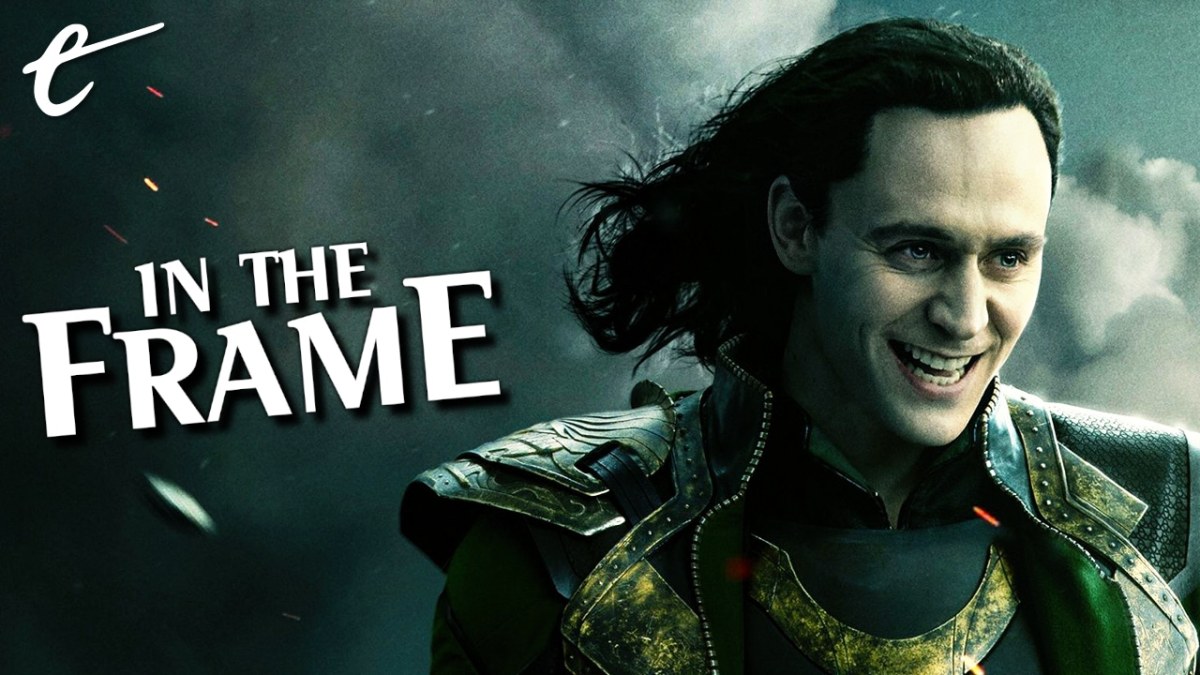With Loki launching on Disney+, it seems as good a time as any to take a look back at the Marvel Cinematic Universe’s God of Mischief and what makes Loki (Tom Hiddleston) such a great villain.
Of course, Loki doesn’t exactly have a lot of competition. Much has been made of the “villain problem” facing the MCU, the difficulty that the franchise has had in crafting compelling antagonists — outside of rare exceptions like Killmonger (Michael B. Jordan) from Black Panther. While the MCU is the most successful movie franchise in history and a cultural juggernaut, it isn’t exactly churning out iconic antagonists.
By and large, Marvel villains tend to fall into one of two categories. Far too many of them are generic men in suits like Obadiah Stane (Jeff Bridges), Justin Hammer (Sam Rockwell), Alexander Pierce (Robert Redford), Darren Cross (Corey Stoll), or even Sonny Burch (Walton Goggins). Others tend to be generic omnicidal nihilists, like the Red Skull (Hugo Weaving), Malekith (Christopher Eccleston), Ronan the Accuser (Lee Pace), or Kaecilius (Mads Mikkelsen). They’re pretty generic.
It is possible to overstate the problem. On one level, it is good business. Historically, villains like the Joker (Jack Nicholson) in Batman or Catwoman (Michelle Pfeiffer) and the Penguin (Danny DeVito) in Batman Returns were seen as overshadowing the hero. As villains tended to die at the end of films while heroes had to carry sequels, the decision to invest more energy in developing their heroes makes sense as a long-term strategy. After all, nobody is queuing up to see Joker 2. (Oh, wait.)
Still, Loki stands as the exception that proves the rule. Loki has proven a popular and enduring character since his first appearance in Thor. Tom Hiddleston has played Loki in six MCU films, appearing more frequently than Jeremy Renner as Hawkeye. The character was killed off in the opening moments of Avengers: Infinity War only for an alternate version to escape into the multiverse in Avengers: Endgame, and he will headline the company’s third Disney+ show.

What makes Loki such a compelling villain? At least some of it is simply casting. Marvel Studios got extremely lucky with the casting of Tom Hiddleston, who had previously worked with Thor director Kenneth Branagh on the BBC crime drama Wallander. Hiddleston is an incredibly photogenic actor and a strong performer, with intense charisma and a wide range. It is no wonder that even the comic books have taken their cues from Hiddleston in how they portray and illustrate Loki.
However, there’s more to it than good casting. Starting with Thor, the MCU has crafted a compelling and engaging emotional arc for the God of Mischief. Indeed, Thor spends as much time on Loki as it does on its title character. While Thor focuses on the fraught relationship between King Odin (Anthony Hopkins) and his impudent son Thor (Chris Hemsworth), the structure of the movie greatly benefits Loki’s character development.
To be clear, Thor has a clear character arc. He needs to become “worthy” of the power that he will inherit from his father. However, Thor’s relationship with his father throughout the trilogy is largely defined by opposition. Thor spends a lot of time away from Asgard, spending most of Thor banished to Earth in accordance with his father’s wishes. One of the great ironies of Thor’s journey towards worthiness is that it pushes him farther away from Odin.
In The Avengers, Thor is dispatched to Earth to help bring Loki home. When he returns to the Nine Realms in Thor: The Dark World, he finds himself tasked with restoring order to the kingdoms beyond Asgard. After Avengers: Age of Ultron, Thor journeys out into the universe in search of the Infinity Stones. Although Thor: Ragnarok reveals that his search has been fruitless, that search has kept him away from Asgard long enough for the realm to fall into anarchy.

A casual observer might suggest that, despite the initial premise of Thor, Thor no longer wants to be ruler of Asgard. When the responsibility is thrust on him in Ragnarok, when he loses an eye to mirror his father, one of his first acts is to destroy the kingdom. In Infinity War, Thor abandons the surviving Asgardians to wage war on Thanos (Josh Brolin). In Endgame, he retreats into reclusiveness and later abdicates responsibility to have epic space adventures with the Guardians of the Galaxy.
As such, Thor’s relationship with his father seems to be largely abstract in addition to oppositional. Thor’s journey to “worthiness” derives in part from his rejection of the trappings of royalty and the authority of his father’s throne. This underscores what makes Loki so fascinating. Loki’s relationship with Odin is much more central to his character than it is for Thor, and the MCU uses that relationship to say interesting things that illuminate both characters.
The relationship between parents and children is one of the most fundamental and important. It is an essential part of the monomyth structure, resonating across countless stories in countless genres. This generational struggle is the essence of Star Wars, as each new group of children grapples with the world that they have inherited from their parents. Even within the MCU, Tony Stark’s (Robert Downey Jr.) relationship with his father (John Slattery) is a character thread that Endgame feels obligated to resolve.
Thor complicates this dynamic between Loki and Odin with the revelation that Loki is not Odin’s biological son. Instead, Loki was an infant Frost Giant that Odin discovered during a military campaign. Odin tries to present his rescue of the child as a heroic and valorous act. “You were an innocent child,” he tells Loki. Loki doesn’t buy that myth of beneficence. Loki understands that he was an instrument: “No. You took me for a purpose. What was it?”

Odin confesses that his political plan was for Loki to eventually unite Asgard and the Frost Giants, to effectively place a prince of Asgard on the throne of Jotunheim. It is an act of realpolitik and statecraft. Loki is understandably horrified by the revelation that he was a political pawn. “I’m no more than another stolen relic?” Loki protests, referring to the vault of plundering artifacts beneath Asgard’s glistening. “Locked up, here, until you might have use of me?”
The Thor movies complicate the character and the legacy of Odin. The Dark World reveals that Odin’s father Bor (Tony Curran) orchestrated the systematic genocide of the entire Dark Elf population, reducing them to renegades and refugees. Ragnarok makes a point that Asgard’s riches were built on Odin’s conquest and expansion. Odin literally banished his daughter Hela (Cate Blanchett) and paved over the inconvenient truths to present himself as the hero of the story.
Hela rightly observes the paradox that Odin was “proud of what he had, ashamed of how he got it.” Perhaps Loki inherited his love of deceit and dishonesty from his adoptive father. One of the recurring ironies of the MCU is the idea that Loki is a much better son to Odin than Thor ever was. Loki has internalized the lessons that his father taught him, and so much of his motivation is rooted in his desire to make Odin proud by doing exactly what Odin did.
In Thor, it initially seems like Loki’s first instinct on discovering his Frost Giant heritage will be to betray Asgard to Jotunheim. Instead, Loki betrays the Frost Giants. He lures them into a setup that he uses as an excuse to target a weapon of mass destruction against Jotunheim. He is so disgusted by his own heritage that he attempts to commit genocide, to wipe out the Frost Giants just as his grandfather wiped out the Dark Elves. Loki learned from the best.

In The Avengers, Loki conspires with Thanos to conquer Earth. His motivations within the movie are hazy, with the character presented as something of a generic fascist more in line with characterizations of the Red Skull. (He even attacks Germany and fights Captain America.) At times, it seems Loki was only included as a continuity reference to the first issue of The Avengers. It isn’t until Loki is dragged before Odin in The Dark World that he offers clear motivation for his actions.
“I went down to Midgard to rule the people of Earth as a benevolent god,” he tells his father. “Just like you.” While Thor cannot wait to get away from his father and the throne, Loki haunts Asgard like a ghost. The structure of Thor means that Loki gets more scenes with Odin than Thor does. He spends a lot of The Dark World trapped in Asgard’s dungeons. Even after he fakes his death, he returns to Asgard. By the start of Ragnarok, Loki has replaced Odin and is ruling Asgard in disguise. While Thor can’t get far enough away from Odin, Loki literally becomes Odin.
This is a complex and compelling dynamic, and it’s arguable that Loki has the most complex and multifaceted relationship with a parental figure within the MCU. At the start of Ragnarok, Loki entertains Asgard by staging a recounting of his own history titled “The Tragedy of Loki of Asgard.” The title fits. Loki is a terrible person who has done terrible things, but he is also the product of a terrible system. It is no wonder that Loki became a monster. Could he have been anything different?
Loki is an orphan taken from his home as a political pawn, the victim of an imperialist power. He was lied to for years, taught to hate his own skin and resent his own identity. He was never allowed to be himself. It’s notable that for all the ease with which Loki changes his appearance, he has never appeared in his original Frost Giant form. For all that pain and resentment, Loki cannot conceive of himself as anything but the son of Odin. Perhaps he cannot help but lie to himself.
Loki is a warped reflection of the classic Campbellian archetype, a twisted mirror to iconic protagonists like Luke Skywalker (Mark Hamill). Loki isn’t just the best and richest villain in the MCU; he is one of the franchise’s most interesting characters.





